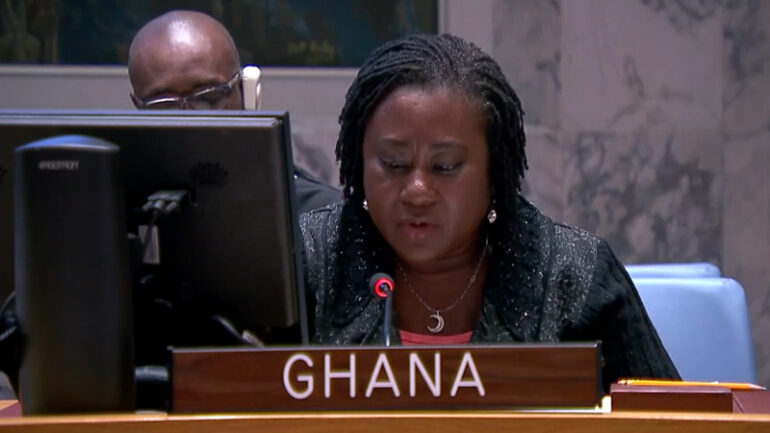The situation in the Middle East, including the Palestinian question

Mr. President,
I would like to begin by thanking Special Coordinator Tor Wennesland for the briefing and for the work being done to ensure an amicable resolution of the dispute in the Middle East, as it relates to the question of Palestine. Ghana takes note of the positive and bold diplomatic attempts by Israel in recent times to improve ties with its neighbours and other countries in the Middle-East region. We welcome yesterday’s historicagreement with Lebanon to demarcate and regulate their rights to gas reserves on their joint maritime border. It is our expectation and hope that this rapprochement will mark the commencement of initiatives by both sides that will lead to normalization of bilateral relations between the two countries.
Mr. President.
We applaud the effort of the government of the United States of America who helped to broker this landmark agreement. We believe that it takes bold leadership to invest in peace and encourage the two countries and all neighbours to work toward good neighbourliness and the sustenance of the goodwill that has been generated in the Middle East, a region with strategic geopolitical and economic importance to the region and the world at large. It is regrettable that the security situation in the Middle-East has not seen much improvement since our last meeting. Rather, there has been an intensification of violence between Israelis and Palestinians in the northern West Bank, in the past month. The period has been marked by near daily Israeli operations to root out militants following a wave of deadly attacks against Israelis. There has also been a spike in the number of raids and arrest, concentrated in Nablus, and the Jenin refugee camp.
Mr. President,
As we have stated in the past, we condemn all incidents of violence, the use of force and unilateral action on both sides. We do not believe that violence can help in resolving the Middle-East conflict and urge all militant groups to channel their energies towards a robust political process that can deliver the much needed peace which is a precondition for regional prosperity and stability. We call on both sides and all stakeholders to take immediate steps to prevent all acts of violence against civilians, including acts of terror, as well as all acts of provocation, destruction, killings, and human rights abuses, in violation of international humanitarian law and relevant Security Council resolutions. As we are all aware, the State of Israel will hold its fifth election in three and a half years in a few days from today. We trust that the vision of the two State solution, which has been widely recognized and generally accepted as a panacea to the protracted conflict, would continue to be upheld as the consensus of the international community.
Mr. President,
In concluding, I wish to reiterate our strong conviction that the growing insecurity in the Middle-East region does not augur well for a peaceful resolution of the conflict. We call on both sides to show maximum restraint and refrain from unilateral actions that could escalate tensions and prejudice the peace and mutual trust that are urgently needed to stabilize the situation and to reverse negative trends on the ground. We urge the Council and the wider international community to be constructive, by sustaining the engagement of the parties whose goodfaith efforts are required to resolve this decades-long conflict.
I thank you.
